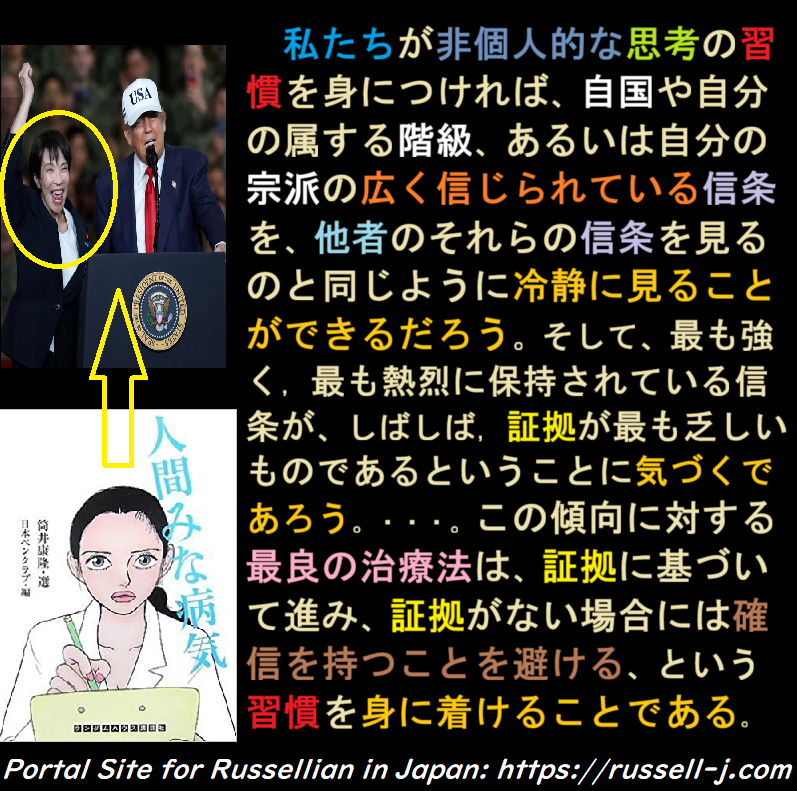
私たちが非個人的な思考の習慣を身につければ、自国や自分の属する階級、あるいは自分の宗派の広く信じられている信条を、他者のそれらの信条を見るのと同じように冷静に見ることができるだろう。そして、最も強く,最も熱烈に保持されている信条が、しばしば,証拠が最も乏しいものであるということに気づくであろう。・・・。この傾向に対する最良の治療法は、証拠に基づいて進み、証拠がない場合には確信を持つことを避ける、という習慣を身に着けることである。
When we have acquired the habit of impersonal thinking we shall be able to view the popular beliefs of our own nation, our own class, or our own religious sect with the same detachment with which we view those of others. We shall discover that the beliefs that are held most firmly and most passionately are very often those for which there is least evidence.
Source: Bertrand Russell: Portraits from Memory, and Other Essays,1956
More info.: https://russell-j.com/beginner/PHIL-VAL.HTM
<寸言>
人間は偏った考え方を好む動物のようです。多くの動物において、間違った認識が生存に危険を及ぼします。人間ももちろん他の動物と同様の側面はありますが、人間の場合、外界に対応するものがなくても、思考や感情だけが膨らみ、ついには自滅してしまうことも少なくありません。 たとえば、韓国や中国の時の政権と日本国民との関係はさまざまですが、特定の政権を嫌いだからということで、その国民全体を罵倒する人がけっこういます。いろいろな嫌な面をあげつらうことによって、日本国民であること(だけ)を理由に自分が韓国や中国の国民よりも優れていると思い込んでいる人が少なくないようです。 中国の人口は日本の約10倍ですので、嫌な側面が日本の10倍、20倍あっても不思議ではありません。韓国や中国の国民を罵倒する日本国民も、日本国民を罵倒する韓国や中国の国民も、嫌いな国民の良い面を伝える記事にはほとんど目を通さないようです。また、マスコミも視聴者が喜びそうな刺激的な話題を繰り返し報道します。カナダなど、メディアリテラシー教育が充実している国々に日本も学ぶべきではないでしょうか?
Humans seem to be creatures that prefer biased thinking. In many animals, a mistaken perception can pose a danger to survival. While humans certainly share many aspects with other animals, in the case of humans, even when there is nothing in the external world to respond to, thoughts and emotions can expand, and it is not uncommon for humans to eventually self-destruct.
For example, the relationship between the governments of South Korea or China and the Japanese people varies, but there are quite a few people who, because they dislike a particular government, end up insulting the entire population of that country. By focusing on various negative aspects, they often convince themselves that, simply by being Japanese, they are superior to the people of South Korea or China.
China's population is about ten times that of Japan, so it's not surprising if there are ten or twenty times more negative aspects. Japanese people who insult the people of South Korea and China, and South Koreans or Chinese who insult the Japanese, both seem to rarely read articles that highlight the positive aspects of the people they dislike. Moreover, the media tend to repeatedly report on sensational topics that they believe will please their audience. Shouldn't Japan learn from countries like Canada, where media literacy education is more developed?
 ラッセル関係電子書籍一覧 |
https://ja.wikipedia.org/wiki/%E3%81%BB%E3%82%81%E6%AE%BA%E3%81%97
 ラッセル関係電子書籍一覧
ラッセル関係電子書籍一覧
#バートランド・ラッセル #Bertrand_Russell